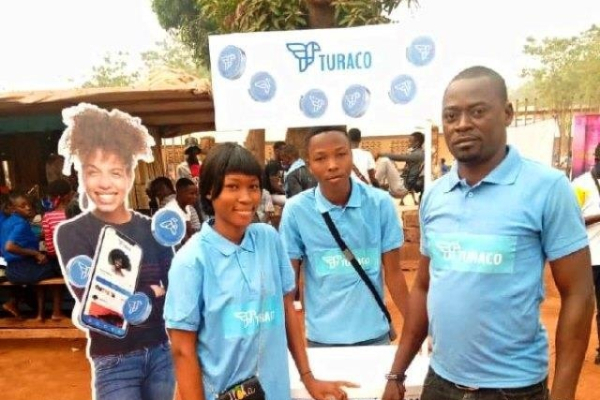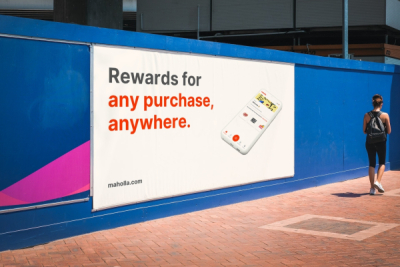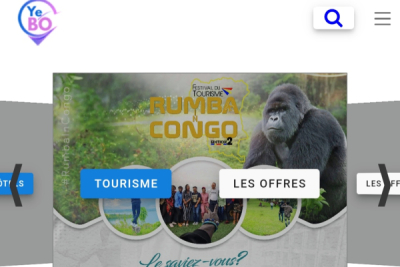
Solutions (583)
Social networks have an important place in Africans’ daily life, despite the continent having a low penetration rate for the Internet and smartphones. In this context, some local tech entrepreneurs have been building African solutions to tap into this market.
Turaco is a social network platform developed by a Central African start-up. It allows users to interact by posting reviews, photos, videos, or even listening to the radio. Founded in 2021 by Gamando Marius Roméo (pictured right), the start-up signed a partnership agreement on Friday, June 30, with the private institute Gutschool. The agreement provides Gutschool with an account on Turaco to publish information related to the university, similar to Facebook or Twitter.
"Turaco is a social network created by a Central Africans for Central Africans, and the goal is to encourage the sons and daughters of this country to use this social network. As in Marketing, the Turaco application is a product and it needs to be consumed. We are trying to boost this application, which is why we are calling on young people of all ages to come to this platform to connect freely and at a lower cost," declared Turaco's founder.
The solution has a mobile application accessible only on Android. After downloading, the user will create a profile and begin interacting with contacts already present on the platform. It is possible, among other things, to contact other users via private messaging, to create discussion groups or join existing ones, listen to the radio, or access information via mass media.
"Through this network, compatriots here and elsewhere can follow the news of the country and listen to several radio stations live. The novelty is that subscribers can already make calls like on Messenger," explained Gamando, three months after the app’s launch.
On Android, the app has been downloaded over a thousand times, and the Central African firm is working to get more people to use the app. For example, it gave out smartphones to top users on several occasions.
Adoni Conrad Quenum
The African e-mobility sector is attracting giants from all over the world. In Sudan, a tech entrepreneur has partnered with his friends to establish a solution to compete in his country.
Tirhal is a technological solution developed by a Sudanese start-up. It connects passengers and drivers in four regions of Sudan. Based in Khartoum, the start-up was founded in 2016 by Mohamed Elzakey, Omer Elzakey, Yaser Abba, and Siddig Eltaj. Since its launch, it has already raised approximately $500,000 to support its growth and develop its technology.
"Tirhal's vision is to work to facilitate people's lives by providing various transport services that suit all groups," the platform states.
The mobile App is available on iOS and Android. Users register by creating an account, allowing them access to various features of the app. To take a ride, users simply input their destination, the type of vehicle, and the starting point, and Tirhal displays the fare for the ride. It is also possible to book a taxi for a future ride.
The start-up also offers delivery services, such as delivering parcels and taking orders from restaurants. Tirhal has a fleet of more than 200 motorcycles. For taxis, the start-up works with 2,900 vehicles that have already traveled more than 100,000 kilometers. A laudable record, despite rocky beginnings.
"When we started, we only had three cars, my uncle's and two of my friends'. Today, we have 45,000 drivers and 4.5 million customers," Mohamed Elzakey explained in 2019.
Tirhal charges 10% of the ride fare. This is a low percentage compared to what start-ups operating in the sector earn. However, this strategy, coupled with the quality of the fleet's vehicles, has allowed the start-up to dominate the Sudanese market. According to Play Store statistics, the Android version of the application has already been downloaded more than a million times.
In 2023, it was among the finalists of the AfricaTech Awards, an event that took place last June 15 on the sidelines of the Parisian technology exhibition, VivaTech.
Adoni Conrad Quenum
In a bid to analyze data on South African consumer behavior, tech entrepreneurs have decided to set up a custom application.
Maholla is a technological solution developed by a South African start-up. It allows users to earn bonus points on all purchases made. The start-up, based in Amsterdam and Cape Town, was founded in 2021 by Adam Reilly and Jed da Silva. Since its launch, it has raised approximately $2.1 million to support its growth, among other things.
The application is available on iOS and Android. Users create an account with their email and phone number and then begin scanning their receipts on the app. Regardless of the store where the purchases were made, users will earn bonus points which can be accumulated and exchanged for various gifts such as airtime, access to the in-app games, etc. Users earn more points when scanning receipts from the start-up's partner brands.
Data collected by Maholla is used for marketing purposes. "Data collected by more than half a million receipts on the Maholla app indicate that members of our youth are turned to wholesalers and bulk retailers to make ends meet," Adam Reilly, co-founder of Maholla, explained in a report. The app collects data on the consumption habits of South Africans, which could help its partner firms adjust their policies as needed.
At present, on Android, the App has passed 100,000 downloads and it successfully raised $1.5 million in a funding round last April. Maholla has recorded more than 8.5 million receipts, according to its data.
Adoni Conrad Quenum
During his final year of medical school, Imad Chakri came up with the idea of creating a mobile application. It aims to assist doctors and healthcare professionals in their daily work.
PocketDoc is a digital solution developed by a Moroccan startup. It allows users, specifically doctors, to access relevant and practical information to enhance patient care. Dr. Imad Chakri (see photo) founded the startup, based in Casablanca, in 2018.
"Despite memorizing medical information for the past 7 years, I constantly forget important details, whether it's a prescription or a diagnosis when working in the hospital emergency department or a healthcare center. There was no solution, so I had to repeatedly excuse myself from patients to search on Google or call a colleague, or treat the patient's symptoms rather than the underlying cause of their illness," Imad Chakri stated.
The solution offers a mobile application available on iOS, Android, and Huawei's AppGallery. Once they download the application, users can register and gain access to various features. These include a list of over 300 conditions in 23 medical specialties, a medical semiotics dictionary, a selection of ready-to-use medical certificates, and a platform to discuss with doctors and healthcare professionals.
The startup generates revenue through subscriptions from doctors and healthcare professionals, as well as advertising from sponsors. According to Play Store data, its Android version has already been downloaded over 50,000 times.
PocketDoc wants to expand outside its local market. "After launching the application, we noticed significant traffic coming from other countries such as Algeria, Tunisia, Senegal, Guinea, Cameroon, and France. [...] Our goal is to be present in all French-speaking countries," Imad Chakri explained.
Adoni Conrad Quenum
The Democratic Republic of the Congo, like many other African countries, has a huge potential for tourism. Here, we take a look at a startup that showcases this potential, both to members of the Congolese diaspora and foreigners.
Yebo is a digital solution that enables users, mainly foreigners and members of the African diaspora, to visit the Democratic Republic of Congo on tailor-made tourist tours. The platform was developed by a Congolese startup, founded by Nelson Badibangi in 2021.
According to its developers, "Yebo is an innovative solution that brings together all tour operators in one place with the best tourism service offers, to make it closer to local and international consumers."
Users can access Yebo’s services via mobile, through a dedicated app. All they need to do is register and explore available offers. It is possible to choose a tour, based on one’s tastes and means. There is also a search bar which helps filter tours, based on users' preferences.
With Yebo, tourists do not have to go through any hassle. Transportation during the trip, short-stay accommodation, sightseeing and visits to private parks and/or tourist sites; the solution takes care of everything. The startup also assists with the administrative procedures necessary to obtain a visa. Users can access the Congolese embassy website from the Yebo platform.
At present, the startup offers over 52 tourist circuits. During the Canadian week in Kinshasa in June 2023, it won a prize for its great impact on cooperation between Canada and the Democratic Republic of Congo.
Adoni Conrad Quenum
After spending several years in the US, Afery Johnson (picture on the left) returned home to Togo, and set up his transport startup.
Lomé Taxi is a ride-sharing solution developed by a young Togolese company. It allows customers heading in the same direction to share transportation costs. Through this solution, users can travel around the city in cars at affordable rates. Already, the startup operates in 11 designated zones within the urban area of Lomé.
"The carpooling concept at Lomé Taxi emerged from the need to lower transportation costs for our customers. Faced with the repetitive rise in fuel prices, we had to increase our fares, and we noticed a decline in the use of our services due to the high cost of living. Through careful consideration, we found a solution that would allow our customers to continue using our services affordably," said Afery Johnson, founder of Lomé Taxi.
The solution does not require a mobile application. Users can easily access it through a web browser. To do so, they only need to provide information such as the departure date, departure time, departure neighborhood, destination, phone number, email address, and the number of passengers. The last piece of information is necessary to notify the start-up that you are open to sharing your ride with another person.
Besides the web platform, reservations can also be made through social media platforms like WhatsApp. SMS and direct calls are also available methods for contacting the start-up to make a reservation.
Lomé Taxi boasts a fleet of over 25 cars and operates from five offices across the Togolese capital. The fare for a trip downtown is CFA2,000, and CFA3,000 for trips to peripheral areas. The startup also offers a special service for people visiting the country.
"The driver picks them up from the airport to their place of residence. For those who no longer want to rent expensive cars during their stay, the company owner provides his car fleet at very affordable rates, tailored to their schedule," according to the platform.
Adoni Conrad Quenum
To bolster access to financial services in Africa, which remains weak, fintech companies have been developing various solutions that fit the African market, and answer the needs of its people.
Two weeks ago, Syca SAS, an Ivorian tech startup launched in 2015, joined the incubation and acceleration program of Scaleway, a cloud infrastructure services provider. The startup was selected with its first module, SycaPay, which launched in 2016.
"This collaboration provides us with an excellent opportunity to accelerate our development and strengthen our position in the market. We look forward to working closely with the Scaleway team and benefiting from their expertise and resources to continue providing innovative solutions to our customers," Mouhamadou Diop, CEO of SycaPay, said.
SycaPay is a fintech solution developed by the startup. It helps companies receive payments from their customers via mobile money, QR codes, and Visa and MasterCard bank cards. The mobile app is available on both iOS and Android.
After downloading the app, businesses must create an account providing the necessary information. Afterward, they can get payments and track their inflows and outflows from their dashboard.
For e-commerce operations, SycaPay offers an application programming interface (API) integration option. "Integrated into an e-commerce website, SycaPay allows merchants to accept mobile money payments without needing an account with every operator," as stated on the platform.
The Android version of the mobile application has been downloaded over 1,000 times. While currently available only in Ivory Coast and Senegal, the fintech company is working towards covering all UEMOA and CEMAC markets.
Adoni Conrad Quenum
In recent years, healthtech startups have revolutionized the way Africans access healthcare. They are democratizing access to care by offering tailor-made services, and boosting tech adoption while at the same time keeping populations healthy.
HealthTag is a healthtech solution developed by Egyptian startup Bypa-ss. It enables access to digitized medical records via a mobile app and a QR-code-embedded card. Bypa-ss was founded in 2019 by Andrew Saad. Since its launch, it has raised $1.15 million to, among other things, develop its technology and support its growth in the country.
“HealthTag (a mobile app and a physical card) aggregates and gives patients ownership of their health records, while giving doctors and healthcare providers visibility on the patient’s full history allowing people-centric digital health information exchange as 1st of its kind in Egypt and north Africa,” the startup wrote in a statement.
The HealthTag mobile app is accessible on iOS and Android. Through it, users can register for their accounts and provide their health details to allow quick access in case of emergency. Thanks to HealthTag, patients can also pay for their medical services online, receive prescriptions and laboratory analyses, and benefit from a 70% discount with healthcare providers in Egypt when doing out-of-pocket payments.
To take advantage of these various services, a subscription is required. While the free package allows users to digitize their medical history and health record, individual packages of 100 Egyptian pounds (approx. $3.24) and 150 Egyptian pounds give several other benefits. The start-up also offers family packages at 250 Egyptian pounds and 350 Egyptian pounds for 5 people.
HealthTag has over 3,000 laboratories, pharmacies, and scanning centers in its medical network. It claims more than 250,000 subscribers, and its Android app has been downloaded more than 50,000 times, according to PlayStore data.
Adoni Conrad Quenum
The solution was launched by a Bissau-Guinean tech entrepreneur to make things easier for human resource departments.
BueloJobs is a digital solution developed by a young Bissau-Guinean start-up, to connect job seekers with opportunities.
On its website, it indicates that it is the “ digital platform that aggregates most of the job openings posted across Guinea-Bissau.”
“We enable professionals to have access and be able to apply to a greater number of job opportunities,” it adds.
The solution features a mobile application accessible on iOS and Android. Once downloaded from the Appstore or Play Store, users can create an account by entering some personal details. They will then be able to access the numerous job offers published on the platform. The start-up provides all the information needed to apply for jobs. Users can also subscribe to the platform's newsletter and receive job offers directly in their mailboxes.
BueloJobs has a blog that covers several topics. Among other things, it shares various scholarship opportunities, competitions, and tips and advice on how to improve one's profile as a job seeker. Users can also post job offers on the platform. Depending on their needs, they just have to click on the dedicated button and follow the process.
Since its launch, the Android version of the mobile application has been downloaded over a thousand times. The start-up has mentioned plans to expand outside Guinea-Bissau.
Adoni Conrad Quenum
The solution enables schools to digitize their data, allowing parents to monitor children’s performance in real time.
Shule System is a digital solution developed by the Congolese firm Find Solution Technolgy. It lets parents access children's school records and track school-related information in real time.
According to Mannick Syllas Bryant, Find Solution Technology’s founder, the solution comes with a complete package offering access to the internet, electricity, and computers because several schools are yet to get basic infrastructure.
Thanks to the package that comes with Shule System, schools can digitalize their data, allowing parents access to various information through the Shule mobile app (available for Android and iOS devices). Among other things, parents can check whether there is still any outstanding school fees, or check their children’s grades, and attendance record. They can also communicate with school authorities on the platform to get additional information on specific topics.
Parents are charged $5 per student every academic year to get access to information. The start-up claims to have registered 24 schools, with 6,232 pupils, and 2,250 parents. It is already present in neighboring Rwanda and plans to expand into Burundi and Senegal. "We have a very large market in the DRC, with more than 90,000 schools and 25 million students [...] The goal within two years is to cover 1,000 schools in the DRC," explains Mannick Syllas Bryant.
Adoni Conrad Quenum
More...
The World Health Organization estimates that 2.5 billion people would have some degree of hearing loss by 2050. In Kenya, a tech entrepreneur has come up with a solution to make everyday life easier for these people.
AssistALL is a digital solution developed by Kenyan firm Signs Media. It connects people with hearing impairments to a sign language interpreter via its mobile app. The solution was launched in 2022 by Luke Muleka.
According to Luke Muleka, the idea for assistAll was born during the coronavirus pandemic when he realized that deaf and hearing-impaired people were completely isolated with the requirements to wear face masks. Indeed, such people communicate with facial expressions and, with the mask-wearing requirement, they were unable to communicate effectively with interpreters. That's when the idea of developing the assistALL application was born.
AssistALL currently has an Android app, with the iOS version under development. Before accessing the platform, users need to register and add a profile picture. Companies or commercial entities may also use the application to promote the integration of their deaf staff. In this case, they register as corporate users.
Luke Muleka explains that the application was developed to promote the socio-professional integration of people with hearing disabilities. Hence, everyone can use it. The Kenyan start-up charges 30 Kenyan shillings (around $0.21) per minute, so users need to top-up their accounts before booking interpreters’ services.
To top-up, they simply need to click on the "Transactions" tab and follow the instructions to top up the account via M-Pesa, PayPal, or Visa cards.
By March 2023, the start-up was claiming over 7,000 users. According to Play Store data, its application has already been downloaded more than 5,000 times. It dreams of entering the Egyptian, South African, and Nigerian markets. "To penetrate the huge Nigerian market, we're looking for $1 million. These funds will enable us to develop our artificial intelligence (AI) to reach as many people as possible," the founder says.
Adoni Conrad Quenum
In the Hausa language, Kaomini loosely translates to “bring me…”. The platform was launched to promote financial and social inclusion. It is gradually carving its niche, attracting a growing number of merchants and customers.
Kaomini is a virtual marketplace launched, in 2017, by Niger Poste, the public postal service operator in Niger. It enables merchants to sell products using unconventional channels. It also enables populations to purchase various products without having to travel.
"Kaomini has vouched to meet the needs of Suppliers who don't have the means to travel to exhibit their products internationally. [...] On Kaomini, products are ordered online via handheld devices. To order, [buyers] need to first set up an account [...] to secure the merchant’s products on our e-commerce site,” says Nasser Salifou Seyni, operations manager at Kaomini.
The solution currently has an Android app. Once registered, buyers can log in and directly access the various products available on the marketplace, such as groceries, food supplements, livestock, and more. It is also possible to order meals in restaurants or send laundry to the dry cleaner.
To back Kaomini, Niger Poste has set up a delivery service and has around a hundred relay points throughout the country to facilitate various commercial transactions. Payment can be made on delivery or via the site's integrated payment methods. Among others, buyers can opt for mobile money solutions or bank cards.
The platform claims between 70 and 80 orders per month. In the medium term, Niger Poste aims to cover around 50% of the national territory. What's more, most of the products marketed on the platform are "Made in Niger", which facilitates access to the specialties of remote regions by residents in major cities.
Adoni Conrad Quenum
The solution was launched by a Mauritanian tech entrepreneur to address the challenges faced by his compatriots when sending remittances to their relatives.
Cadorim is a fintech solution developed by a Mauritanian start-up. It enables the Mauritanian diaspora in Europe to send remittance home.
The startup behind the app is based in Nouakchott and Brussels. It was founded, in 2018, by Mohamed Elmoctar Neine. Guests can browse the web platform to get a feel of its services without creating an account.
In case they need to make a transfer, users can register for an account or just log back in and provide the required information to complete the transaction. Among other things, the user will be asked to enter the amount in euros or pounds sterling, the recipient's first and last name, telephone number, the receiving city, and whether the person will receive the money in cash at one of the fintech's branches or in their MauriPay e-wallet.
Once the transaction is validated, the next step is to upload a valid identity document issued by a European country to finalize the procedure.
“The technology used by Cadorim is based on the blockchain which guarantees maximum security. It protects your money both when sending and withdrawing,” the platform assures.
Cadorim also allows users to send money to Senegal and Cameroon. These transactions are carried out through its partner MauriPay. Recipients receive the funds directly into their e-wallets. Unlike Cadorim, MauriPay has a mobile application. In 2019, the start-up won the first edition of the Fintech Challenge organized by the Central Bank of Mauritania
Adoni Conrad Quenum
Besides its drive-through, the solution also offers food delivery services.
Ordera is a mobile application developed by an Egyptian start-up. It enables users to order food in advance, pay for it and benefit from drive-through service. They can then collect their meal without having to get out of their car, and therefore without having to queue.
Based in Cairo, the start-up was launched in 2019 by Karim Abdel Kader, Noha Bassiouny, and Abeer Mostafa. It has already raised $150,000 to support its growth.
Through its mobile (Android and iOS) app, a user can order food from over 150 partner restaurants, cafés, and fast-foods. He/she can track the order progress and even get the classic delivery service. All the user has to do is enter his or her location to have it delivered.
Ordera also gives its customers loyalty points that can be exchanged for gifts in partner stores. The start-up makes money by charging partners a commission on each order. Its Android app has been downloaded over 50,000 times. After Cairo, it has now expanded to Alexandria, the first step of its nationwide expansion.
Adoni Conrad Quenum















